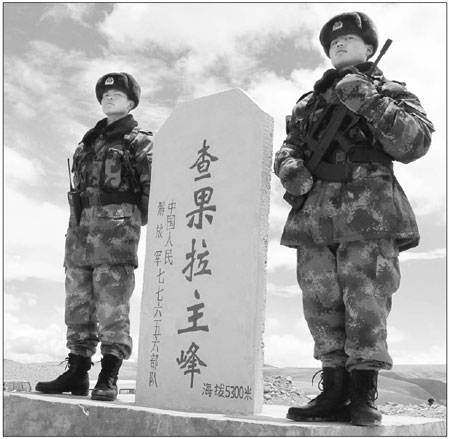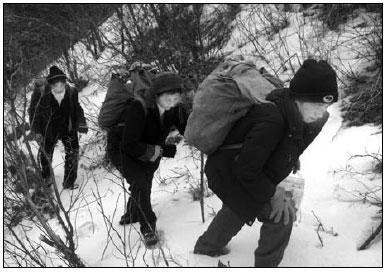Tough at the top
 |
|
Young guards stand on duty at Chaguola, the highest border sentry post in Tibet autonomous region. Wang Kaihao / China Daily |
Summer is the best season in Tibet autonomous region but even so soldiers at their sentry posts overlooking the China-India border in Zhanniangshe, Yadong county, still wear their heavy coats.
Du Jiangnan, a 26-year-old border defense soldier on the 4,738-meter mountain outpost, has just come off duty and is taking a rest in his simply furnished dormitory.
As it often does, the conversation turns to the death four years ago of three comrades, which he says, made him appreciate the value of life.
On March 2, 2007, one of Du's fellow soldiers, Yu Hui, was on duty when he slipped down the side of the mountain and was severely injured. Du and five other soldiers were attempting to save him when, suddenly, there was an avalanche, which trapped them.
While the first sergeant stayed with the injured Yu and an army doctor, Du and the other soldiers managed to get out and trekked for 12 hours, their faces frozen and arms bleeding, to get help.
It took a couple of days for the rescue party to find the three soldiers they had left behind. But it was too late.
His three comrades had frozen to death and Du is still haunted by the memory. He makes phone calls to the three soldiers' parents every week. Sometimes, he gathers with other soldiers outside the sentry post to sing songs memorializing his fallen comrades.
"I don't want to say too much because our country knows where we are," is how one song begins, referring to the sacrifices all soldiers make in the course of duty.
"If my fallen comrades knew I was still here at my post they would be proud of me," Du says, tears falling. "I'm going to complete their mission."
Today, there's a safer path leading to Du's military base nicknamed "the post in the cloud". After the tragedy, a staircase of 666 steps was built to connect the post and the recently built gravel road leading to the bottom of the mist-shrouded mountain.
By the side of
 |
|
Three women volunteers from Qinggang village carry supplies up the mountain to the border posts in Yadong county. Liu Youfei / for China Daily |
Every year in October, the steps leading to the outside world are cut off by 2-meter-thick snowfalls for about six months.
"During this time, we are isolated and sometimes joke that the post is like an orphanage," says Ma Guanjing, a 23-year-old soldier.
Snow is important to the soldiers because it is their main source of water during winter, while rain provides for their needs during the rest of the year.
"Snow and rain taste strange," Ma says. "It's like the smell of smoke."
Though the soldiers do have bottled mineral water, rain and melt water is used for cooking and washing.
Supplies arrive by jeep and then the soldiers or their three Tibetan "aunties" carry the goods up the mountain.
These three women, from Qinggang, a village near the county seat of Yadong, are unpaid volunteers and carry supplies, usually bags of food, to Zhanniangshe and four other posts nearby.
"The reason I do it for free is simple," Dekyi, 54, says in fluent Mandarin. "It's tough for the soldiers living here."
She started carrying supplies up the mountain in 1982, followed by 58-year-old Chozin and 49-year-old Butri. They carry up to 25 kg of supplies, twice a month, in all weather, usually leaving home at 4 am and returning at 8 pm.
The soldiers eat five or six dishes at every meal and particularly like Sichuan cuisine. Agarics, sweet potato noodles, and seaweed, are nicknamed the "three treasures" by soldiers, as they are staple foods, which are dehydrated so they can be stored for a long time.
Naturally, however, they look forward to vacations when they can eat fresh vegetables.
"Any fresh vegetable is a luxury for us," 25-year-old He Zhendong says. "We don't like the three treasures anymore."
In 2008, solar and wind energy facilities replaced the diesel dynamo that used to provide electricity; while wooden floorboards have replaced the stone floor, which often created sparks when there were lightning storms.
After years of service, many of the soldiers have developed rheumatism because of the humidity and cold weather. They do not shower often in the biting cold because they fear catching a cold, which could lead to serious respiratory problems.
"The thing I look forward to most is taking a bath when the officers pick us up and take us to the county seat," He laughs.
He says he likes to soak in the tub for more than an hour when he gets the opportunity, adding its "super comfortable".
"We don't let our parents come to Zhanniangshe because we don't want them to get sick," He says. "When we make phone calls home, we will tell them life here is comfortable, just in case they worry."
Most of the soldiers claim they're not concerned about the future and are happy to concentrate on doing their duty. But He says he wants to return to his parents.
"I want to go back home to feed the ducks after I retire from the army," he says.
"Even so, I won't regret coming here because it's not an experience many people have."
















